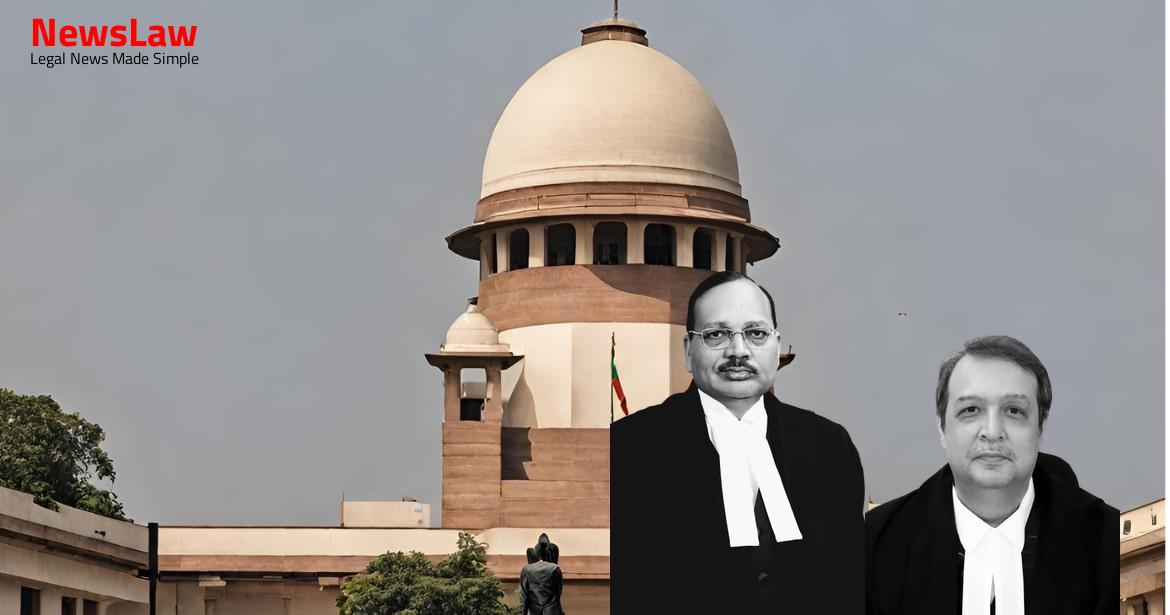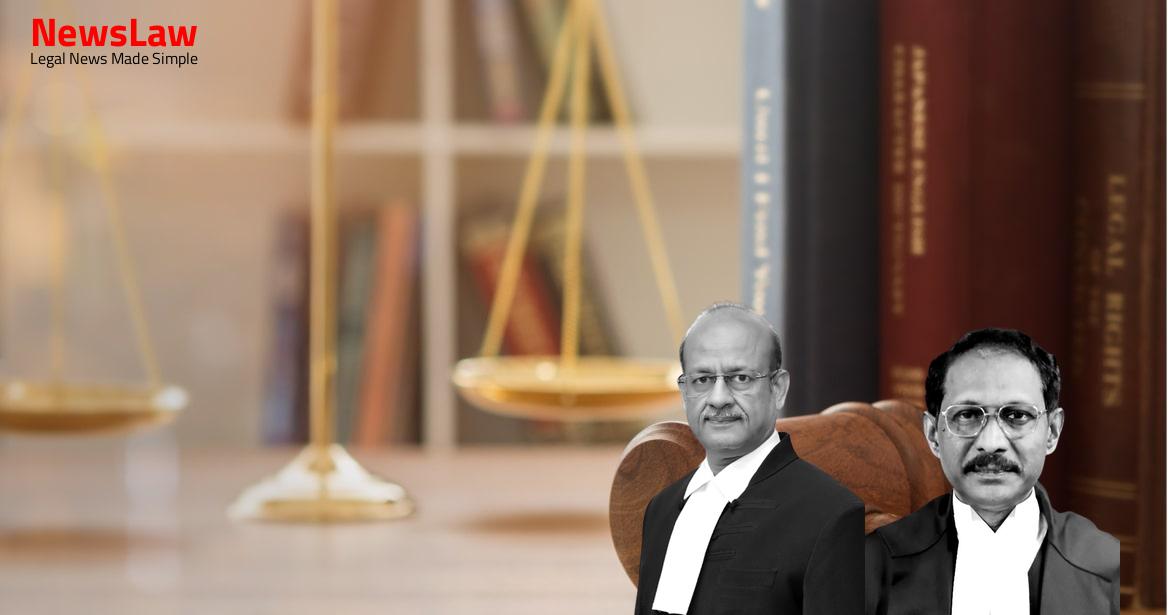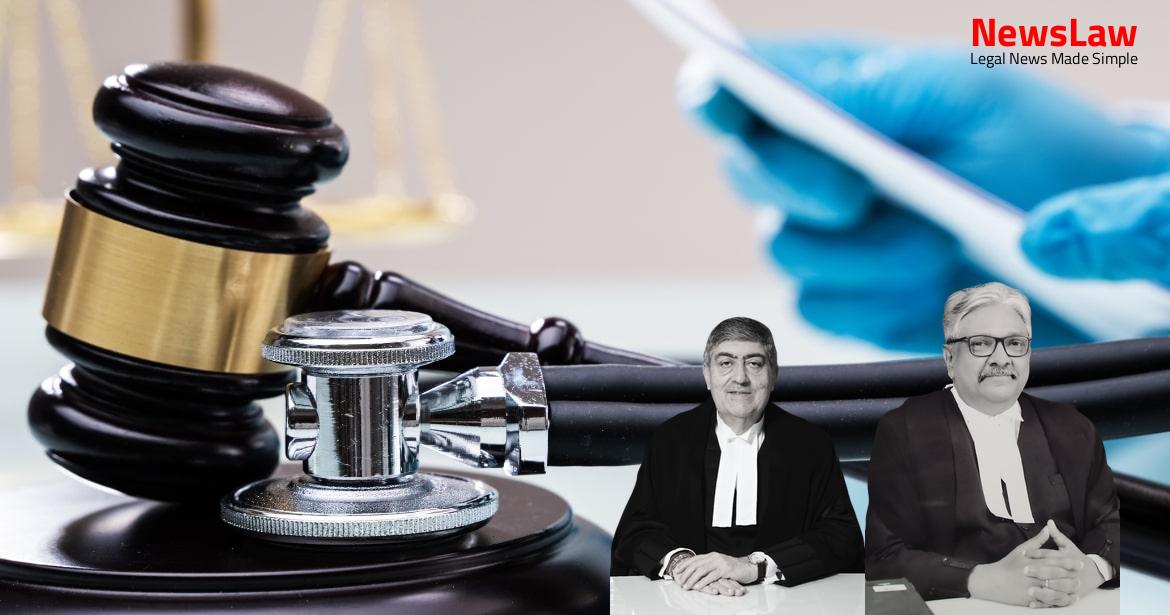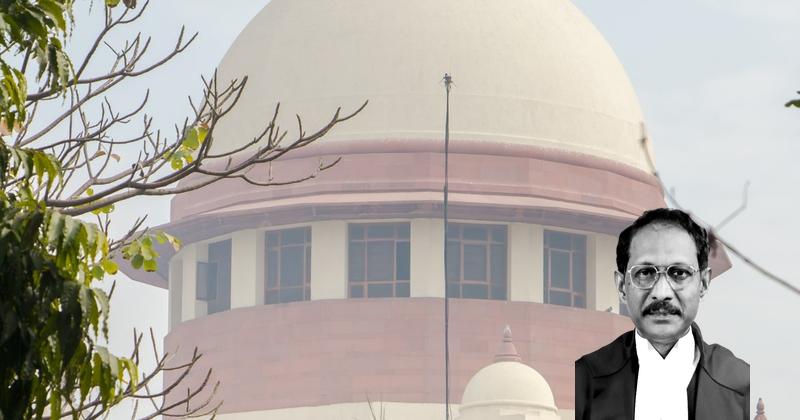Explore the in-depth legal analysis of a disproportionate assets case where the court meticulously examines the burden of proof and evidentiary standards required in criminal proceedings. The case highlights the importance of substantiating allegations with credible evidence and the court’s critical role in scrutinizing the investigation methodology to ensure the administration of justice in line with legal principles.
Facts
- The Respondents in these appeals, a husband and wife, are accused of acquiring properties beyond their known sources of income during the period from 1.1.2002 to 29.2.2004.
- The Respondents sought discharge from the trial based on lack of a prima facie case against them, citing their assessed income and expenditure during the mentioned period.
- The investigating agency found the properties acquired by the Respondents to be disproportionate to their known sources of income, leading to the registration of a criminal case against them.
- The Respondent No. 1 constructed a terraced house worth about Rs.7,99,500 in the name of his wife after demolishing the old terrace house.
- The investigation revealed assets in the name of the Respondent No. 1’s wife, father-in-law, and minor son, totaling Rs.18,41,680 by 29.2.2004.
- The Respondent No. 2, the wife of Respondent No. 1, also faced allegations of abetment in the case.
- The Respondent No. 1 was a motor vehicle inspector and the investigation found him in possession of assets exceeding his known sources of income.
- The Respondents were discharged from the prosecution based on the information and explanations provided during the investigation.
- The High Court allowed the Revision Applications filed by the petitioners (AI and A2) on 27.04.2017.
- The Special Judge found that the charges against the accused persons were not groundless and there was a prima facie case to put them on trial.
- The respondents challenged the Special Court’s rejection of their discharge applications by filing Criminal Revision Application Nos. 702 and 703 of 2016.
- The Special Judge rejected the discharge applications of the respondents in separate orders dated 29.03.2016.
- In one instance, the petitioner argued that her income from being a partner in S.K. Mat Industries and from money lending business was not considered by the Investigating Officer while assessing property ownership.
Issue
- The court decided that the claim for discharge by the petitioner based on the properties standing in the name of the petitioner’s wife not being considered separate from the petitioner’s was not sustainable under law.
- The Investigating Officer’s methodology in calculating the total value of assets in the petitioner’s name during the check-period was deemed erroneous.
- The petitioner contended that the income from sources other than S.K. Mat Industries by the petitioner’s wife was not factored in, amounting to Rs. 5,90,342 during the relevant period.
- The Investigating Officer did not consider this additional income mentioned in the Income-Tax returns submitted by the petitioner’s wife.
Arguments
- The petitioner and her husband are accused of grave offences related to amassing wealth disproportionate to their known sources of income.
- The court rejects the petitioner’s plea for discharge, stating that trial is necessary to establish the case with evidence.
- The High Court’s finding that the prosecution must prove the case beyond all reasonable doubt even at the stage of framing charges is deemed erroneous by the Special Judge.
- The Investigating Officer’s method of evaluating the assets of the husband, considering properties in the wife and minor son’s names as belonging to him, is deemed reasonable at this stage.
- The final report provided by the Investigating Officer is stated to prima facie disclose the essential elements of the alleged offences.
- The defence’s submission that properties in the wife’s name cannot automatically be attributed to the husband based on income tax assessments is highlighted.
- The defence argues that a mini-trial should not be conducted at the stage of framing charges and that the court should not consider documents produced by the accused during this stage.
- The defence references previous court rulings emphasizing that the court should assume the prosecution’s materials are true and focus on the existence of ingredients constituting the alleged offence while framing charges.
- The wife of the respondent is a commerce graduate and entrepreneur, having an independent source of income through a money lending business.
- The Investigating Officer failed to consider the explanation provided by the respondent regarding his wife’s income.
- The respondent’s wife has been an income tax assessee since 1990 and regularly filed her income tax returns.
- The Investigating Officer did not give due consideration to the fact that the respondent’s wife had acquired properties from her own income.
- The Investigating Officer erroneously stated that the respondent’s wife had no source of income and disregarded the evidence provided.
- The assets standing in the name of the respondent’s wife and son should be excluded when determining the respondent’s assets.
- The Investigating Officer did not properly consider the income derived by the respondent’s wife through her money lending business.
- The petitioner’s wife had sufficient source of income to acquire properties, as evidenced by her income tax returns, which were disregarded by the Investigating Officer.
- The court decided that the petitioner is not entitled to a discharge based on the methodology error by the Investigating Officer.
- The regular payment of income tax by the respondent’s wife since 1990 was not disputed.
Also Read: Supreme Court Judgment:
Supreme Court Upholds Benefit of Input Tax Credit in Uttar Pradesh Value Added Tax Act 2008
Analysis
- The analysis section of the judgment delves into various aspects discussed during the case proceedings.
- Key points highlighted in the analysis include discrepancies in the income sources of the accused and his family members as well as the assessment of assets acquired during the check period.
- The investigator’s methodology in computing the assets and financial resources of the accused and his family is scrutinized, with a focus on the correctness of the approach taken.
- The role of the Investigating Officer in considering explanations offered by the accused and their family members is brought into question.
- The importance of evidence and burden of proof in establishing guilt in criminal cases is reiterated.
- The High Court’s decision to discharge the accused is critiqued, emphasizing the need for substantial justice and adherence to legal principles.
- The section also touches upon the role of supervisory powers in revising lower court decisions, particularly in cases of potential miscarriage of justice.
- The conclusion reached is that the prosecution failed to establish a prima facie case against the accused based on the available evidence and proceedings.
- Under Section 401 of Criminal Procedure Code, quashing of charge by High Court justified if offence not made out even after considering prosecution evidence
- Burden of proof lies upon prosecution in criminal trial to prove accused’s guilt with requisite mens rea
- Accused not obligated to prove innocence beyond all reasonable doubt, needs to establish preponderance of probability
- Concept of ‘preponderance of probability’ taken from Charless R.Cooper V F.W.Slade
- Judicial order cannot be passed without providing reasonable opportunity of being heard, particularly when it affects one’s reputation
- Act done under repealed Act deemed to be done under corresponding provisions of the new Act unless inconsistent
- Accused not bound to prove innocence beyond all reasonable doubt in criminal cases, guilt must be proved beyond any reasonable doubt
- Guilt in criminal cases must be established to a degree where a reasonable person with ordinary prudence can have no doubt
- Section 13 of the Prevention of Corruption Act, 1988 is not a substitute for Section 5 of the 1947 Act.
- Section 30(2) is applicable without prejudice to the application of Section 6 of the General Clauses Act.
- The explanation to Section 13(1)(e) defines ‘known sources of income’ as income from lawful sources intimated by the public servant.
- The application of Section 13 of the 1988 Act in the present case would contravene Section 6 of the General Clauses Act.
- Section 13 of the 1988 Act is materially different from Section 5 of the 1947 Act.
- The accused’s guilt or innocence should not be in doubt.
Case Title: STATE BY DEPUTY SUPERINTENDENT OF POLICE Vs. R. SOUNDIRARASU ETC. (2022 INSC 915)
Case Number: Crl.A. No.-001452-001453 / 2022



